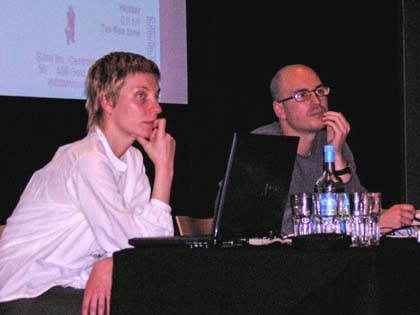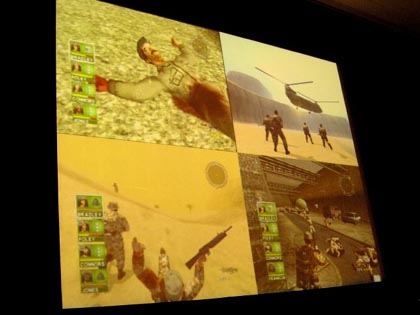Virtual, Activist or Managerial (Games Culture in the Balance)
FACT’s recent conference, Situationist Sim City: Critical Video Gaming Conference, June 28, 2004, attempted to analyse how the ‘virtual’ world of games infects and informs ‘real’ life and vice versa. But between the artistic modifications of corporate software which remained too close to their originals and the activist blue-sky games which lacked any tangible results, Mathew Kabatoff found the participants’ approaches fell short of an effective engagement with the genre
 > Kristan Lukic and Jelena Klasnja presenting Civilization IV : Age of Empires
> Kristan Lukic and Jelena Klasnja presenting Civilization IV : Age of Empires
First: Situationist Sim City (SSC) had nothing to do with Situationism. Second: SSC had nothing to do with Sim City. Third: SSC was not a conference, i.e. nothing was produced, nothing was contextualized, nothing was worked out by the participants, audience or organizers, no ballads were sung. The event lacked clarity, even focus. What cards then did SSC deal? To whom? And to what discourse?
The answers: SSC took place on May 28, 2004 at FACT, Liverpool, UK. SSC consisted of a single panel of four speakers: Natalie Bookchin – AgoraXchange; Julian Dibbell – The Unreal Estate Boom; Ed Halter – War Games; and Kristan Lukic and Jelena Klasnja – Eastwood Real-Time Strategy Group. A select number of invited guests made up the audience and tea and biscuits were served during an intermission which split the panel in two. And the discourse... the discourse was on video games, or more precisely the way in which the imaginary of the video game can be seen as crashing into, and meddling with, the symbolic apparatus of the real world.
So here we get to something of interest, the idea of the potential excess produced by the video game functioning beyond the limits of its own simulation. But unlike the perennial hope expressed by some new media academics who claim to have discovered the workings of a virtual world beyond, what was implied in the presentations was the notion that this excess was in fact nervously quantifiable; that somehow 'game' play or simulation could have direct effects upon the real world.
The speakers' list:
1.
Ed Halter began the afternoon on a quizzical note reading from his text ‘War and Games’, by opening with two quotes: one from Colin Powell on the coming invasion of Iraq stating that ‘war was not a game’, and more recently from Susan Sontag regarding prisoner abuse at Abu Ghraib saying that ‘war had been increasingly turned into a game’, which he condemned as representing a 'naturalisation' of the relationship of war and games. This accusation was ironic because Halter followed it with a precise historiography of video games that represented the marriage of war and games since the time of the Ancient Chinese Imperial Court and the game 'lei hi'. To make matters even more puzzling, he then presented the discourse of contemporary video games as nothing but this war/game interrelation. Into this eddy then, and Halter's history. From 'lei hi,' or 'go’ – the highly abstract game designed to simulate the surrounding and capturing of 'enemy' pieces and territory – Halter moved quickly to the modern, setting up the 19th century Prussian Kriegspiel as the realist forbearer to the more recent, mind-bending first-person shooters such as America's Army and Kumawar.
Halter described the Kriegspiel as literally the first 'war-simulator' that allowed players, mostly military officers, to recreate or test battle sequences, initially working from the tactics and strategies of the Napoleonic wars. The Kriegspiel's first design relied heavily upon a complex rule and scoring system where teams were situated on opposite sides of a room with a battlefield board placed in between [1]. Each side would compose a move according to the rules of conduct determined by the scenario and present those moves to an umpire (high ranking military official), who would consult the game’s liturgy and determine the battle’s outcome. Due to its rather rigorous and mathematical process, the Kriegspiel, was believed to be a tactical supplement to battlefield practices and could be used to not only train soldiers, but to actually predict possible outcomes of multiple campaigns cooked up in the minds of Prussian hawks. According to Halter, this predictive purpose of the Kriegspiel didn't exactly work, casting a shadow over the game itself, but this notion of the simulator-as-war-machine-indoctrinator didn't go away. Enter America's Army – the contemporary US state sponsored war simulator aimed at creating popular appeal for the total destruction of an enemy target and to educate players in the rights and routines of military life.
 > Images from Gotham Games' Conflict: Desert Storm, released to coincide with Bush's call for a new war on Iraq
> Images from Gotham Games' Conflict: Desert Storm, released to coincide with Bush's call for a new war on Iraq
But from here it gets a little confusing.
What Halter went on to describe in relation to America's Army and Kumawar – two games played from the perspective of American military might – were not the strands of game play and education contributing to the normalisation of the ‘casual fascism’ that appears in video game play and certainly makes up military life (thus making Sontag's statement about life taking on the brutality of the game appropriate if not entirely accurate), but rather the all-to-known contradictions of the links between entertainment, academia and the State, military or otherwise. By representing this type of flattened articulation, Halter delivered neither a critique of how these games function in terms of their language or as spectacle and propaganda, nor did he provide room to at least mention a small counter-movement developing in the video-game modification world that is actually producing games to combat the war-simulation obsessed gaming world. The statements of Powell and Sontag may perhaps be clichéd, but they still acknowledge the realness of torture and death, and that the codes at work in video games are trying their hardest to pass for the 'real' thing.
2.
Kristan Lukic and Jelena Klasnja (Eastwood Real-Time Strategy Group) presented two video game modifications – Explorer '98 and Civilization IV : Age of Empires – each managerial in their discontent. Both were modifications of world building simulation games: Explorer '98 was a skinned version of Command and Conquer and Civilization IV built itself up onto of Microsoft's Civilization IV video game. Both employed the same conceptual approach involving the un-ironic mapping of the components that make up the mega-corporation, or relationships between mega-corporations, creating environments where users play and learn what it means to be Sony, Microsoft, Halliburton.
 Explorer '98, as its name suggests, consisted of turning the Microsoft Explorer '98 programmatic structure into a playing field where users are asked to explore a terrain made up MS icons and conduct missions in order to prosper in the terms set out by a type of 'life' simulator. Game play was intended to educate players about the inner workings of the Explorer '98 browser all the while functioning much in the same way as the game engine it was built upon. With Explorer '98 Eastwood wanted to uncover the naturalised processes implicit in Explorer '98 as well as to map its programmatic structure. The problem with this project however, was that the game did not provide any new or secret information about the browser other than what was already freely provided inside of Explorer '98, nor did it lead computer users into a world of game play any different from what has become well known. For instance, a critique against Mircrosoft could involve patent law, or the fact that Microsoft software does not exist within patent law because the corporation doesn’t hold a patent on its own source codes. What Microsoft has done instead is withhold its principle invention from potentially expiring into and becoming a part of, in 50 years or so, the public domain. Recently a large section of Windows 2000 code was released onto the internet most likely by an employee, and seeing as the code is not protected by patent law there was a two second delay before Microsoft lawyers were able to clamp down on the distribution of the code with the aid of other intellectual property laws, i.e. those protecting trade secrets. Instead, rather than performing a critique of Microsoft ’98, Eastwood’s project is more suitable for a Mircosoft outreach campaign.
Explorer '98, as its name suggests, consisted of turning the Microsoft Explorer '98 programmatic structure into a playing field where users are asked to explore a terrain made up MS icons and conduct missions in order to prosper in the terms set out by a type of 'life' simulator. Game play was intended to educate players about the inner workings of the Explorer '98 browser all the while functioning much in the same way as the game engine it was built upon. With Explorer '98 Eastwood wanted to uncover the naturalised processes implicit in Explorer '98 as well as to map its programmatic structure. The problem with this project however, was that the game did not provide any new or secret information about the browser other than what was already freely provided inside of Explorer '98, nor did it lead computer users into a world of game play any different from what has become well known. For instance, a critique against Mircrosoft could involve patent law, or the fact that Microsoft software does not exist within patent law because the corporation doesn’t hold a patent on its own source codes. What Microsoft has done instead is withhold its principle invention from potentially expiring into and becoming a part of, in 50 years or so, the public domain. Recently a large section of Windows 2000 code was released onto the internet most likely by an employee, and seeing as the code is not protected by patent law there was a two second delay before Microsoft lawyers were able to clamp down on the distribution of the code with the aid of other intellectual property laws, i.e. those protecting trade secrets. Instead, rather than performing a critique of Microsoft ’98, Eastwood’s project is more suitable for a Mircosoft outreach campaign.
The second project, Civilization IV : Age of Empires, was much more complex, yet unfortunately functioned in the same way as its predecessor, mapping one-to-one, the narrative of mega-corporations onto the narrative of 'empire', although this time with a much more attractive design framework and audio soundtrack. With Civilization IV Eastwood really wanted to show the complex relations of power at work between global corporations, however this 'showing' could be considered questionable because of the difficulty of mapping such complex subtleties, and because the game itself relies upon a Microsoft game engine meaning that a biased understanding of how these entities interact is more than skin deep. For this type of game to 'work,' that is to get under the skin of the dominant, it would have to either provide an excess of information that could be used to critique (or heaven forbid exceed) the multi-national, or it would have to work to show the broken multiplicity operative in contemporary global capital. At least with this last point there would be the potential of creating a truly 'mad' gaming machine, and it may even be fun to play.
3.
Julian Dibbell presented his recent journalistic work on the state of massive online multi-player role playing games (MORPGs) along two registers: first as an Ultima Online (UO) enthusiast who made $47,000 US in 2003 buying and selling UO characters and artifacts on ebay.com; and second as a pseudo-legal theorist who tried to pose a set of questions specific to the 'real world' economy that supports these online gaming worlds and has existed since 1997. As enthusiast, Dibbell illustrated the process of value creation in the UO world: a subscriber creates a character within Ultima Online, this character is born innocent, born free and born with the goal of acquiring status in the form of land, title, commodity and most importantly experience points; in order to get these experience points characters must be taken on 'dangerous' missions or perform other tasks worth of a world building simulation (i.e. becoming a blacksmith and make weapons for a source of revenue etc.). Depending on how many missions, gold pieces, experience points, and hours the subscriber has racked up, they have the opportunity to not only gain virtual status and occupy a virtual place in the sun, but $$ profit as well.
This can be described as the standard operation of Ultima Online and other games such as Everquest and Lineage (both with subscription bases of 455,000 and 4 million respectively), in terms of character advancement and player fantasy projection. The player’s imaginary is literally locked within this constraint: spend an erroneous amount of time absorbed within the world and you become 'grandmaster'. Where a rupture occurred was where certain qualities of the game could not easily be overcome. When subscribers realised they did not want to spend 40 or 80 or 120 monotonous hours making their character race ready, finding enough gold pieces to buy new armour, or developing their wealth and status, a 'real' market of character, object and real estate swapping developed, etc... This then was the terrain in which Dibbell the enthusiast purportedly operated.
As legalist Dibbell brought more facts to bear. In 2001 legal professor Edward Castronova did a micro and macro economic analysis of Sony's Everquest, which consisted of measuring how many user hours went into the acquisition of virtual commodities and experience, which could later be brought to the ebay.com market and sold. He discovered that on ebay.com there was $5 million dollars in transactions annually, making the GNP of Everquest $135 million dollars. This works out to provide an hourly working wage of $3.42 US to players of Everquest (and subsequently Ultima Online), and made Everquest in terms of wealth, the 79th richest nation in the world, equivalent to Bulgaria. As described by Dibbell, the legal questions that came out of this were precisely related to the valuation of intellectual property: if Sony or UBsoft (makers of Ultima) own the intellectual property of the video game and subscribers are essentially 'renting' or rendering the use of a service during a certain time, how is it legally possible for users to create a profit through ebay.com auctions from digital artifacts that are essentially owned by the game manufacturer? Or conversely, how can the subscribers’ time be quantified so that they in turn have the right to make a profit from the use of the service they are provided? Apart from these details, and in response to Dibbell's own interest in this cultural form of the past seven years, the creation of a real money economy from 'virtual' practices is not as astonishing as he makes out. Perhaps there is some curiosity and some absurdity in what is traded online – virtual polar bear rugs, giant purple beetles etc. – but is it not the case that all economies are in a sense 'virtual', involving an agreed upon system of signs to render value? If this economy was truly 'other worldly' it would not be analysable by Castronova.
 > Image from 'The Saga of Nations', a presentation in the AgoraXchange website, by Natalie Bookchin and Jacquie Stevens
> Image from 'The Saga of Nations', a presentation in the AgoraXchange website, by Natalie Bookchin and Jacquie Stevens
4.
Last, Natalie Bookchin closed the afternoon with a current project, in collaboration with political theorist Jacquie Stevens called AgoraXchange, a half game idea, half political text that envisioned a way to 'radically' change the world. This game-text hybrid was proposed by Bookchin and Stevens as a 'world' simulation game set five minutes into the future and stripped of all laws barring four 'decrees' of user conduct : 1. No Citizenship – users of this world would not be bound by citizenship; 2. No Inheritance – wealth would not be passed between generations, once a death occurs the wealth of the individual is sent to a state repository to be redistributed; 3. No Marriage – contracts would be drawn privately between consenting individuals for child-rearing or other purposes; 4. No Private Land Rights – all land would be owned by the state and rented to individuals or enterprise that would have to prove they were not causing environmental damage [3]. These four rules then would become the basis for conduct within the game taken on by Bookchin, and the theoretical core to be carried forward by Stevens.
Some noble ideas, but what seemed to be missing from the presentation was a resolution on how this project would 'perform'. Along the road to the first stages of development, Bookchin and Stevens have decided not to dive into game or theory production, but present the 'potentiality' of this idea to primarily the art and new media going public (groups of legalists have also been brought into these discussions) at numerous conferences and in an online forum, that asks the question: ‘what could this game be?’ It seems that Bookchin and Stevens are trying to frame their project within the paradigm of emergent social movements (by using the 'language' and 'style' of the user-form) currently fashionable within the art/new media worlds, rather than taking their 'four decrees' to the most effective location, the world of state policy and decision making. Let's face it, with all the talk of Revolution on their website, what they are proposing is very academic stuff. A LITTLE MODESTY PLEASE! But that is not to say the potential is not there to impact on how state policy is formed. What it does as policy text is present a set of nervous 'what ifs' to audiences (again, right now mostly the art world and academics) who hold on to dominant cultural values in support of capital, nation and marriage, or those things that Bookchin and Stevens are trying to critique. Since this nervous 'what if' could be potentially productive within a policy regime, why not focus their energy there, or at least follow through with the production of a video game that could address these issues, instead of fixing their impetus firmly within the speculative new media and art conference networks, making activist claims.
What has happened as a result of this attempted contextualisation is that the game itself has been supplanted by the 'potential' for a game or the 'discourse' around the game, precisely everything but the game. Instead of pushing forward with production, if only to produce a small segment of the large task they have set out for themselves, they have opted to produce nothing. This is troubling because the act of production (art/politics) is more likely to create some new avenues for their work, thought, and collaborations to travel down. By maintaining their posture on the lecture circuit they risk either losing the game as a productive text, or their decrees becoming haughty political theory, or both. This is not a question of either/or but a question of production. Production of the game could have an impact on their theoretical text, it could even be an effective political artwork in itself; why not take that chance? Production and implementation of their theoretical text in the worlds of policy, or within an activist world that can accommodate these ideas could provide valuable information for the game and it could begin to realise its potential as politics. Why not take that chance? ...I double-dare you.
SSC. Four points; and yes, games can function as sophisticated artworks, and yes games can function as another version of the cultural text.
[1] Bookchin, Natalie and Stevens, Jacqueline, Decrees, June 2004, http://agoraxchange.net/index.php?page=271#271
[2] Dibbel, Jullian, 'The Unreal Estate Boom' Wired Magazine. January 2003
[3] Griffith, Patty, Map kriegspiel, June 2004, http://home.freeuk.net/henridecat/kriegspiel/mapkreig.htm
Mute Books Orders
For Mute Books distribution contact Anagram Books
contact@anagrambooks.com
For online purchases visit anagrambooks.com






